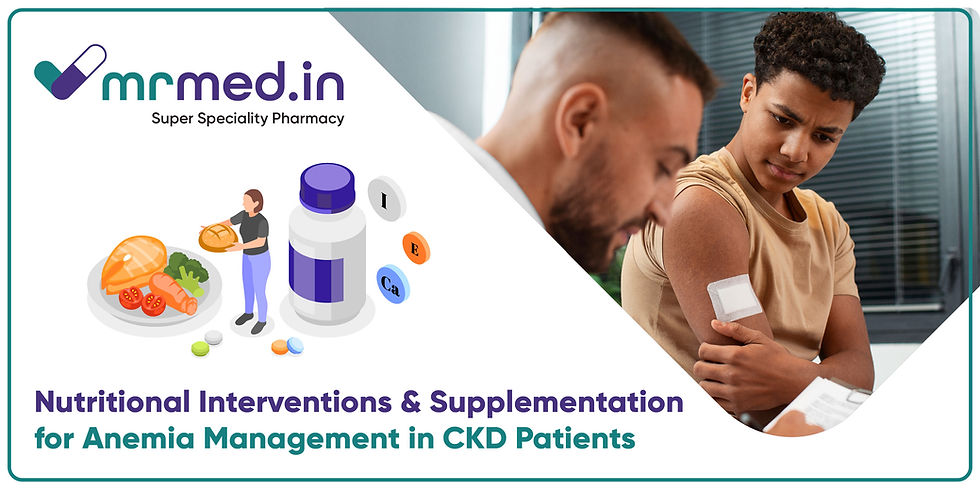Nutritional Interventions and Supplementation for Anemia Management in CKD Patients
- devendrasingh1
- Aug 28, 2024
- 3 min read

Anaemia management in Chronic Kidney Disease (CKD) can be challenging and significantly affect a patient's quality of life. Various causes, such as decreased erythropoietin production, iron deficiency, and an imbalance in other important vitamins and minerals, can cause anemia in CKD.
A well-balanced approach is required for effective treatment. This involves both targeted supplements and overall nutritional therapy. Combining these treatments can help treat anaemia in CKD effectively, enhancing patients' overall health and treatment outcomes.
What causes anaemia in CKD?
The kidney’s inability to produce erythropoietin, which is important for red blood cell production, causes anaemia in CKD. Chronic kidney disease may also cause iron deficiency due to poor absorption of iron, often due to dialysis. Deficiency in vitamin B12 and folate can also contribute to anaemia. Thus, effective anaemia management requires taking care of these factors with proper nutrition and supplements.
What foods are good for anaemia in CKD patients?
Dietary strategies play a vital role in managing anaemia in CKD patients. Foods enriched with vitamins and minerals can help manage anaemia better.
Iron-rich food
Iron plays a key role in producing haemoglobin, which is important for red blood cell functions. Absorption of iron can be enhanced with Vitamin C. Thus, patients with anaemia in CKD should add more iron and vitamin C-rich food to their such as
Red meat, pork and chicken
Beans
Spinach
Green peas
Seafood
Broccoli
Sunflower and pumpkin seeds
Citrus fruits
Peppers
Vitamin B12 and folate
Vitamin B12 and folate are crucial for the production of DNA synthesis and red blood cells, which can help prevent and manage anaemia. For overall well-being and effective management, try to add foods such as
Cheese
Eggs
Chickpeas
Milk
Brussels sprouts
Cabbage
Kidney beans
As CKD affects the absorption of these nutrients, dietary intake alone will not help to meet the daily needs for vitamin B12 and folate. Consult with your doctor and try to take some supplements to satisfy your daily needs for these nutrients.
What are the supplements used to manage anaemia in CKD?
Iron supplements
Oral iron supplements are most commonly prescribed to treat iron deficiency anemia. In rare cases of iron deficiency where oral supplements are not absorbed well, intravenous iron may be used as it can be directly absorbed. These supplements should be taken after proper medical advice as they may have complications such as gastrointestinal disturbances and an overload of iron.
Vitamin B12 and Folate Supplements
As dietary intake cannot satisfy daily needs, Vitamin B12 and folate supplements are frequently used. These supplements can enhance the production of red blood cells and improve overall health. Depending on an individual's needs and absorption capacity, they are available as tablets, sublingual, or injections.
What medication is used for anaemia in CKD patients?
Oxemia is an erythropoiesis-stimulating drug used for managing anaemia in CKD patients. Oxemia 50mg tablet belongs to the group of HIF-PH inhibitors that activate hypoxia-inducible factors (HIF), boost the synthesis of red blood cells and improve the body's use of iron. It works by stimulating erythropoiesis, enhancing the production of red blood cells.
What are the practical tips for managing anaemia in CKD?
While dietary changes and supplements can help manage anaemia in CKD, certain lifestyle changes can also help.
Regular Monitoring: Regular check-ups are crucial to monitor blood levels and iron status. This helps in adjusting treatments and supplements.
Balanced Diet: Consider a diet that includes a variety of nutrient-rich foods. Consider consulting a dietitian to create a meal plan tailored to your personal preferences.
Medication Adherence: Follow the prescribed regimen for supplements and medications. Consistency is important in managing anaemia effectively.
Hydration: Adequate hydration is essential for overall health and for the efficient functioning of kidneys and other organs.
Lifestyle Adjustments: Incorporate regular physical activity. Exercise can enhance overall well-being and help manage symptoms of anaemia.
Wrapping up
An effective intervention for CKD anaemia involves dietary intervention and specific supplementation. Using a proper diet and a recommended treatment plan, patients with CKD can effectively improve their anaemia condition and increase their health span and well-being. You should always seek the advice of your doctor to get the right treatment to improve health complications related to anaemia.



Comments